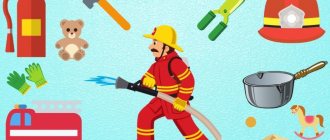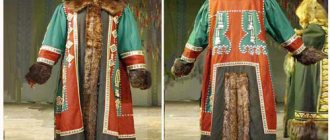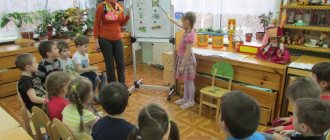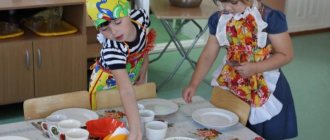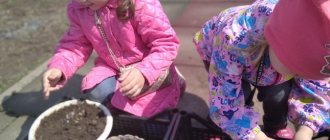Project duration: short-term (November).
Project type: educational and informational
Project participants: preparatory group children, teachers, parents, music director, speech therapist
Children's age: 6-7 years
The problem is that we are faced with the fact that children, even in the preparatory group, do not all know the names of their parents’ professions, the characteristic features of this specialty
Project goals: to expand children’s understanding of the role of work in people’s lives and the variety of professions
Project objectives
For children
— Enrich children’s ideas about the diversity of the world of professions in society;
— Expand children’s knowledge and understanding of their parents’ professions (parents’ place of work, the significance of their work; pride and respect for the work of their parents);
— Expand ideas about different types of labor, about the structure of the labor process (goal, motive, material, tools, set of labor actions, result);
— Develop the ability to correlate labor results and a set of labor processes with the names of professions;
— Foster a conscious attitude towards the value of adult labor;
— Arouse curiosity and interest in the activities of adults;
— Enrich children’s vocabulary with special terms specific to a particular profession;
— Show the relationship between different types of labor;
— Learn to display ideas about the work processes of adults in role-playing games, conveying in the game the attitude of adults to work;
— Develop creative imagination, the ability to jointly develop a game, coordinating one’s own game plan with the plans of peers, imagining oneself in different social roles;
— Develop understanding and ability to evaluate people’s actions;
— Develop the ability to use speech-evidence to substantiate your judgments;
— Encourage children to think about choosing a future profession.
For teachers
— Create an information base: creating presentations about various professions, producing a book of children's stories about professions;
— Selection of works of art on the topic of the project;
— Recording of the video “Who do I want to become?” (followed by display at the final event);
— Selection of didictic and printed board games, illustrations on the topic of the project;
— Create conditions for active, independent and jointly with an adult, creative, playful activity of preschool children through role-playing games;
— Enrich the subject-development environment on the topic of the project;
— Ensure the implementation of educational, developmental and training tasks through children’s mastery of educational areas;
— Continue to develop coherent speech in preschoolers;
-Develop interest in children and parents in project activities.
For parents
— Engage in joint activities with children when creating products of project activities;
- Stimulate the creative and cognitive activity of children;
- Conduct a conversation - a story about your profession;
— Conduct a master class for children (parents’ hobby).
Organizational stage
1. Creating a problem situation for children, the solution of which the project will be aimed at, using a model of three questions:
I
- Why do you need to work? What do your parents do, what do you know about their professions? What do you want to be when you grow up?
II
-What do we need to do to find out?
III
Where can we find out? How can we tell everyone what we learn?
2. Joint discussion with children about the stages of work on the project
Content-practical stage
Health and physical development
- Introduction to professions related to sports;
- Daily thematic rhythmic exercises;
- Sports leisure “At the athletics stadium”
- Thematic physical education minutes
- P/i “Firemen in exercises”, “Cosmonauts”, relay race games
- Compliance with work schedule (work and rest)
Safety
- “How to prepare for a subbotnik?” — discussion
- Safety rules for household work
- People of different professions have their own safety rules
Cognition
- Presentations “All works are good”, “The master’s work is afraid”, “Professions”
- Examination of reproductions, albums, illustrations on the theme “Professions”
- Series of conversations: “Who works in kindergarten”, “Objects and tools needed by people of various professions”, “World of professions”
- Conversations about the professions of parents and relatives, their places of work
- Didactic games: “Give me a word”, “Guess who it is?”, “Toy store”, “Who can tell you more about the profession!”, “Guess what I’m doing?”, “What’s first, what’s next?”, “Where you can should I buy this?”, “Name the profession”, “What to whom”, “Guess the profession”, “Who can’t do without them”, “Professions of people”, “Who does what? “,” “Names of professions from A to Z,” “What would have happened if I hadn’t worked...”, “What they do with this object,” “What the object will tell.”
- Labor process modeling
- Using logic games
- Using TRIZ elements when solving problem situations
- Drawing up a diagram for writing a story about professions
- Round table “Professions that have appeared recently”, “Let’s tell Smart Guy about changes in the work of people in some professions” (children’s choice: driver, baker, doctor, etc.), “How it was before, and how it is now”
Socialization.
Interaction with parents:
Meeting with an interesting person:
- Karina’s dad is a police officer “Our service is both dangerous and difficult...”
- Timur’s dad is a traumatologist, problem situation “What happened to the monkey”
- Alice's grandmother is a former kindergarten teacher
- master class by Vasilisa’s mother – “In the pottery workshop” (clay modeling and baking in a muffle oven)
Games and conversations
- Role-playing games: “Shop”, “Garage”, “Library”, “Builders”, “Hospital”, “Hairdresser”, “Beauty Salon”, “Television”
- Imitation games: “Mom’s Helpers,” “Cooking Dinner for the Whole Family,” “We’re Making a Movie”
- Game situation: “Who will I become?”
- Conversation about the qualities that a person who wants to get a particular profession must have “This profession suits me”
- Game-discussion “I am in the past, present and future” (work is the main activity of an adult)
Communication
- Writing stories about parents' professions
- Learning poems about various professions
- Enriching children's vocabulary with new terms
- Guessing crosswords and puzzles on the topic “Professions”
- Children's stories from personal experience “At a doctor's appointment”
- Making a dictionary of professions
- Proverbs and sayings about work
- Discussion of phraseological units about work
- Computer game for the development of verbal and logical thinking “Such different professions”
Work
- Household and household work in a group
- participation in a subbotnik (work in nature)
- manual labor
Fiction
Proverbs and sayings about work Poems and riddles about professions Reading poems and stories about professions
V. Mayakovsky “Who to be? ", M. Poznanskaya "Let's go to work", D. Rodari "What do crafts smell like", S. Marshak "Where did the table come from", "We are military", S. Mikhalkov "What do you have? ", "Uncle Styopa", "Uncle Styopa is a policeman." In Lifshits “And we will work.” B. Zhitkov “Railway”,
M. Ilyin “Cars on our street” N. Naydenova “Olga Pavlovna”. S. Baruzdin “Who built the new house”,
L. Voronkova “We are building, building, building”,
Music
- Musical game “If you have fun, do it this way”
- Song about the masters (Y. Kim, A. Rybnikov)
- Conversation about creative professions related to art (pianist, conductor, composer, singer, ballerina, artist)
Artistic and creative activities
Exhibition of drawings “Who will I be” Making attributes for games: “Mail”, “Shop”, “Pharmacy”, “Television” Coloring coloring books - professions Drawing tools and equipment, using stencils in your work Modeling - vegetables and fruits, confectionery Creation layout "City of Masters"
Play activity
- Board games - “Professions”, “Who should I be?”, “Associations”, “Who needs what for work?”, “We know all professions”, Puzzles “Professions”, “Couples” (by topic), “Associations”, lotto , dominoes, cut pictures
- Didactic games “Give me a word”, “Guess who it is?”, “Toy store”, “Who will tell you more about the profession”, “Guess what I’m doing”, “What first, what later”, “Where can I buy it” , “Name the profession”, “What to whom”, “Guess the profession”, “Who can’t do without them”, “Professions of people”, “Who does what? ”, “Who needs what”, “Names of professions from A to Z”, “What would have happened if I hadn’t worked ...”, “What is done with this object”, “What will the object tell.”
- Games “Where we were, we won’t tell you what we did, we’ll show you”, “If you have fun, do this”
Working with parents
- consultations for parents “Children’s responsibilities at home”
- placement of materials in parent corners
- design of a photo newspaper together with parents “Mom at work”
- consultations with parents on conducting master classes and conversations with children
Final stage
— Holiday "City of Masters"
Project results:
- Teachers are satisfied with the work done and the results of the project
- All material on the project topic has been collected and systematized
- Preschoolers have developed an interest in this topic;
- A holistic understanding of the work activity of adults has been formed
- Children know and name a large number of professions, proverbs, sayings about work, tools, and can write a descriptive story about the profession.
- Children have become more liberated and independent. In free activities, singing songs is widely used, attributes and outfits are used for this purpose.
- Parents developed an interest in the educational process, the development of creativity, knowledge and skills in children, a desire to communicate with the teacher, and participate in the life of the group.
- Parents have the opportunity to introduce their profession to all children in the group
- The celebration “City of Masters” was prepared and held
Technology Project Topics
1st, 2nd grades:
| 1: | 2: |
| • Paper aviation • The eternal companion of a book • Magic snowflakes • How I sew a doll from threads • When clay comes to life • Collage “Animals and Birds on the Red Page” • Childhood boat • Our family’s New Year’s toy • Window to a fairy tale • From seed to sprout • Plasticine fantasy • Give a bookmark as a gift • Come to us for tea (tea set made of plasticine) • Bird's dining room • Once a leaf, two leaves... • Fairytale hut • Flower panel • What has autumn brought us? • Miraculous transformation of a pine cone | • Fun zoo • Life of a plastic bottle • Funny cat (movable toy) • Cone-based toys • Flat and voluminous toys • History of Christmas tree toys • Bird feeder • Rocking horse • My first car • From pattern to product • 3D postcard • Where from are the threads taken? • Floral ornament • Different fabrics are needed • The wonderful world of postcards • Patterned rug • What is symmetry? • Miracles for children from unnecessary things • Eco-notebook |
3rd, 4th grades:
| 3: | 4: |
| • Paper - a second life • Vase using papier-mâché technique • How to create gift wrapping? • How to sew a soft toy? • Contour seams: stem and loop • Tank model • My friend plasticine • My zoo using origami technique • Monogram as a napkin decoration • Folk costume for my doll • Unusual sandwich • New Year's mask • Volumetric machine • Finger theater • Professions of my family • Russian birch made of beads • Salt dough fish • Straw toy • Fruit salad “Vitamin basket” • Stem stitch patterns | • Baking – craft or science? • Embroidery is a grandmother's inheritance • Let's make a model of a carriage! • Photo frame decor • What are minerals for? • There are different types of pincushions • Toys in our lives. Soft toy • The story of one cake • How are shoes made? • We create a book ourselves • Sculpting is a miracle • Patchwork for the kitchen • DIY board game • Table lamp • Why does a kite fly? • Butterfly potholder • Snowflakes using quilling technique • Baubles made from floss • What do we know about the rocket? • Wonderful transformations of plasticine |
Topics for Literary Reading Projects
1 class:
• DIY letters • Fun alphabet • The best riddles about the hare • My favorite fairy tale by A.S. Pushkin • About fables • The image of Baba Yaga in Russian folk tales • Proverbs about the book • Birds in fairy tales • Stories that teach goodness and justice • The tale of my parrot • Poems about animals • How does a fairy tale differ from a story? • Family reading • I write riddles
2nd grade:
• Fables for all times • Spring in mysteries • The magical world of nature in the stories of M. Prishvin • The newspaper “Schitalki” • Illustrations for the poem “Cunning Mushrooms” by V. Berestov • The history of the book • My stories “Learning to read and write is always useful” • My homework library • Nursery rhymes and jokes: what's the difference? • Secrets of fairy tales • Dictionary for “The Tale of the Fisherman and the Fish” by A.S. Pushkin • Directory “The funniest stories” • Poems about true friends • What do fairy tales teach? • Extremely interesting magazine • What are tongue twisters?
3rd grade:
• There were also fables • In the workshop of the first printer • The great Russian fabulist I.A. Krylov • Quiz based on the works of V. Bianchi • Magic objects in Russian folk tales • It all started with a tablet, a scroll, birch bark... • Gzhel • Winter in the image of A.S. Pushkin • Golden Khokhloma • How to come up with a boring fairy tale? • Colors of poems about nature • Literary and folk tales: similarities and differences • Small genres of oral folk art • A proverb is an assistant to all matters • Poster “Russian folk songs” • Poetry about the seasons • Signs of a fable • Handwritten books of Ancient Rus'
4th grade:
• Epics: about valor, about exploits, about glory • The life and work of B. Zhitkov • The Golden Shelf of Books • How do I write a scientific and educational text? • Calendar of historical events • The beauty of our native nature in the works of A. Fet • My parents’ favorite books • My reading diary • My favorite book • The extraordinary storyteller E. Schwartz • The image of spring in the poems of F.I. Tyutcheva • Autumn forest I.A. Bunin • Features of L.N.'s fables Tolstoy • Victories of the Russian hero Ilya Muromets • The most famous nanny of the 19th century • Serious values in the frivolous stories of V. Dragunsky • Creating a fairy tale • Reference book “On the heroes of bygone times” • Fantastic story - easy! • Fantastic story “Journey to Mars” • What does the Motherland mean to me?
Music project topics (grades 1 – 4)
| 1: | 2: |
| • Poster for a musical performance • Harpsichord: the history of a musical instrument • The beauty of the native land, captured in music • Music of autumn • Musical ABC • Musical instruments in pictures • Portraits of animals in music • Russian ditties | • Life and work of composer M.P. Mussorgsky • From the history of operetta • History of lullabies • Melody is the soul of music • Music and theater • Russian folk instruments • Fairy tales in music • Piano music as an art form |
| 3: | 4: |
| • In the world of jazz music • What is the strength of Russian folk song? • World L.V. Beethoven • Violin music - a song of the soul • Musical works about nature • Russian folk songs • The wonderful world of the flute • What is romance? | • A.S. Pushkin in Russian music • The influence of music on human health • Music in my family • Musical instruments in Russia • P.I. Tchaikovsky: music and children • Songs scorched by war • Poetry and music • Svyatogorsk Monastery |
Easy project topics in physical education (grades 1 – 4)
| 1: | 2: |
| • Why do we need sports? • Ball games • Dad, mom, me – a sports family • Morning exercises | • Hardening - the path to health • First sports competitions • Outdoor games • Sports in my city |
| 3: | 4: |
| • Volleyball is a game for everyone • His Majesty football • My physical training • Physical education in Ancient Rus' | • Basketball in my life • Sports • Air hardening • Olympic Games in Ancient Greece |
Project topics in English (grades 2, 3, 4)
| 2: | 3: | 4: |
| • English toys • Friends • Collage “Fruit vegetables” • Summer holidays • My hobby • Pet • My favorite food • My favorite toy • My family • School uniform • Holiday table | • At the Zoo • Merry Christmas! • Heroes of English fairy tales • Wild animals • Favorite school subject • My daily routine • My favorite fairy tale • My country • At the post office • New Year's card • Relaxing in the country | • English and Russian tea drinking traditions • Sights of London • Pen pals • Who do I want to be? • Favorite time of year • My school • Rules of etiquette in Great Britain • Holidays in England • Professions • Tea in England - more than tea • I go to the store |
Project topics in the Russian language (grades 1 – 4)
1st, 2nd grades:
| 1: | 2: |
| • The ABC of polite words • The letter E and its problems • Funny tongue twisters • Where is a capital letter used? • City of letters • Riddles about letters • History of the emergence of written speech • Disappeared letters of the Russian alphabet • My favorite letter • Our speech • Secrets of dialogue • Dictionary words | • Dialogue or monologue? • Entertaining tasks in the Russian language • Invisible sound • Interesting about synonyms • What are the types of texts? • Lepbook “Parts of speech” • The world of adjectives • NOT with verbs: together or separately? • The unusual letter “Ъ” • Dictionaries are our helpers • Test “Similar words” • I rhyme! |
3rd, 4th grades:
| 3: | 4: |
| • In the world of dictionary words • Polite words in our speech • The meaning of cases of the Russian language • Toiler prefixes • The origin of the names of cases • A story about the word _ • The Russian language in my life • Secrets of word formation • Compiling a spelling dictionary • You or You? • Doubled consonants: examples and exercises • What do I know about the verb? • These amazing phraseological units | • Album of rules of the Russian language • Magic words • Secondary members of a sentence • Verb in Russian • Why do we need punctuation marks? • The adjective is so wonderful • The art of asking for help • What do people around you say? • Discovering the secrets of nouns • Secrets of adverbs • Weed words in our speech • Test “Homogeneous members of a sentence” • What do I know about personal pronouns? |
What project topics can I choose in the visual arts?
| 1: | 2: |
| • A city for fairy-tale characters • Composition of buttons • Magic patterns • Panel “Bullfinches on a branch” • Gift wrapping “Handbag” • Floral ornament • Symmetry in painting and art • Amazing garland • Colored landscapes • Miracle tree using appliqué technique • I draw spot | • Watercolor and its expressive abilities • Paper plastic: the underwater world • Winter birch • How to decorate a kokoshnik? • How do I create a palette? • Collage of dry leaves • Frosty patterns on the window • Unconventional drawing techniques • Autumn forest with wax crayons • Drawing is my hobby • Wonders of applique |
| 3: | 4: |
| • V.M. Vasnetsov – a storyteller with a brush in his hands • Spring in the paintings of Russian artists • Decorative panel “Rowan Branch” • Dymkovo young lady • When is it nice to look at shop windows? • Matryoshka - the image and soul of Russia • Still life • New Year's poster • Park sculpture • Traveling through the Hermitage • Painting a cutting board • Lanterns - decoration of the city | • Architecture of Ancient Rus' • Vases of Ancient Greece • Easter egg design • Ancient Asian city • Maslenitsa in painting • Image of a Russian hero • Monument to the hero-defender • Landscapes of Russia • Ancient Russian tower • Creativity of I.I. Levitan • What I.I. liked to portray. Shishkin? • Japanese motifs |
